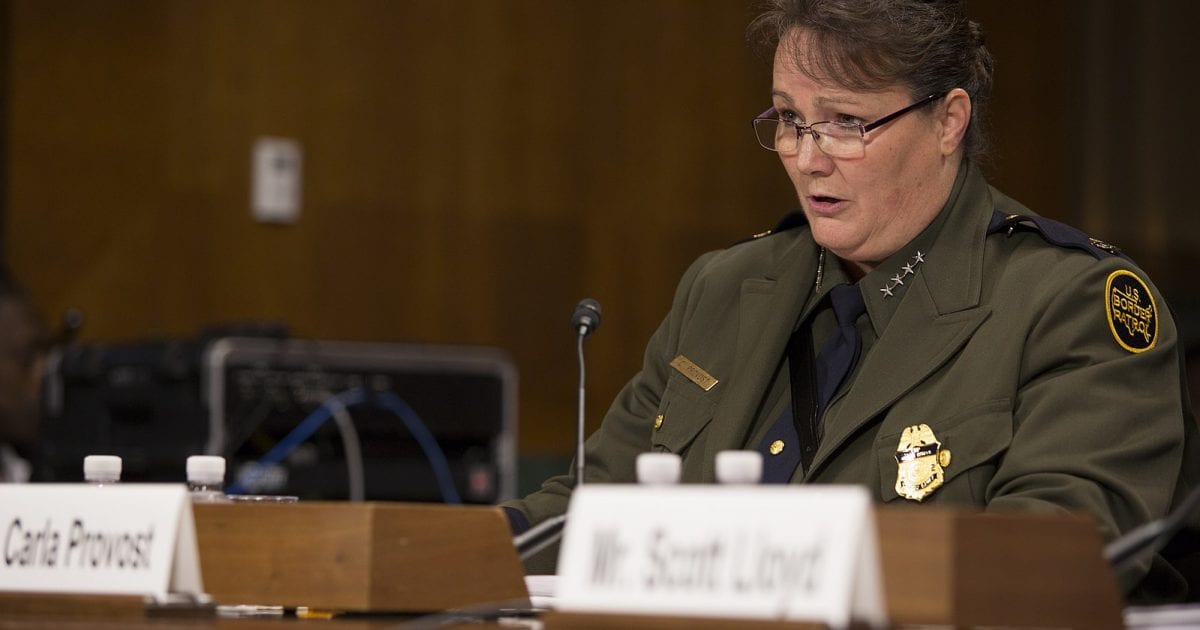I’m not sure who could be a much better authority on whether or not there’s a crisis at our southern border than U.S. Border Patrol Chief Carla Provost.
And she may have just put the nail in the coffin on any continued debate about the crisis at the border with her recent testimony to Congress.
Spoiler alert: there is a Crisis and it’s bad.
From the Daily Caller News Foundation:
U.S. Border Patrol Chief Carla Provost broke down in a testimony to Congress why the situation at the U.S.-Mexico border qualifies as a national security crisis.
“There is an ongoing debate as to whether this constitutes a border security crisis or a humanitarian crisis. Let me be clear, it is both,” Provost, President Donald Trump’s top border official, said Tuesday during a hearing in the House Judiciary Committee.
Provost’s comments run counter to claims made by Democrats and other Trump critics who argue that, because border apprehensions are down considerably from 20 years ago, there is no actual crisis. While the 361,000 people the Border Patrol caught in fiscal year 2018 is less than half of the 1 million who were caught in the 1990s and 2000s, Provost says there is more to the numbers than meets the eye.
“I’ve been asked many times how the current situation can be a crisis compared to years when we surpassed 1 million apprehensions,” the Border Patrol chief said to lawmakers. “To understand the numbers, you have to look at what’s happening on the ground.”
In years past, the majority of those apprehended at the border were Mexican nationals who, after taken into custody and documented by Border Patrol, were handed over to Immigration and Customs Enforcement’s Enforcement and Removal Operations office for deportation. In present time, more than half of all border apprehensions are Central American children or families. Due to a 2008 trafficking law, the children cannot be immediately deported because these they are not from Mexico or Canada.
Provost says the demographic changes have stretched her agency thin.
“Each day, nearly 25 percent of my agents are diverted away from our border security mission to care for, transport and process family members and unaccompanied children,” she said Tuesday. “We know that when agents are occupied, narcotics smugglers, criminal aliens, gang members and others use the opportunity to violate our borders and our laws.”
Agents are being challenged with other requests that are clogging their operations, in addition to the demographic changes. Many of the apprehended migrants are asking for medical care, requiring around 5,000 of her 2,000 agents to care and transport them to medical centers instead of manning the southern border.
Provost’s comments fly in the face of numerous Democratic critics who have deemed Trump’s crisis declaration a “fake emergency.” Congressional Democrats on Tuesday voted to block Trump’s emergency declaration, and a number of progressive groups are suing to block the move in court.
And from the LA Times:
Carla Provost, who served as acting chief of the Border Patrol for more than a year, on Thursday was named the first woman to lead the agency as chief in its 94-year history.
Provost, a former police officer in Kansas, joined the agency 23 years ago as an agent in Douglas, Ariz., rising through the ranks to become a supervisor in Yuma and El Paso. She also served as deputy assistant commissioner of Internal Affairs, which included overseeing compliance with Customs and Border Protection programs and policies involving corruption, misconduct or mismanagement. She became deputy chief of the Border Patrol in 2016 and is the agency’s 18th chief.
“There is no one more suited to lead the Border Patrol,” Customs and Border Protection Commissioner Kevin K. McAleenan said in making the announcement.
Provost, 48, answered questions from The Times about herself and the agency. The interview has been edited for length and clarity.
What is the greatest challenge facing the agency now on the southern border?
Ensuring the safety and success of the men and women in the field on the front lines. Every day, they put their lives on the line. Our agents are facing some of the most challenging environments under the most difficult of circumstances. I want to make sure that they have the very best training, the best equipment, the resources they need and the strongest possible support.
Operationally, the Southwest border of the United States is a highly diverse environment with equally diverse threats to the security and safety of our border communities and communities throughout the United States.
Without the resources, without more agents and without some changes in our abilities to enforce our laws, we will continue to see an increase in drug smuggling, an increase in gang members trying to infiltrate our communities by crossing into our nation illegally, and we will continue to experience increases in the flow of illegal immigrants coming to the United States.
The Trump administration’s “zero tolerance” policy and immigrant family separations have made headlines, and figures released this week show a greater share of those arriving at the southern border are families. What would you like people to know about how the Border Patrol responded this summer and how the agency plans to deal with immigrant families in the future?
Today, we have suspended referral for prosecution of parents who are traveling with their child or children as we work through a process to enforce the law and maintain family unity through the criminal prosecution of the adult.
I want to be clear that at no time was the policy of the Border Patrol or [the Department of Homeland Security] to separate families. The separation of families occurred only as a result of prosecution of a parent for illegally crossing the border. In my experience, I know that when there is a consequence for a crime committed, that the frequency of the crime decreases. Without consequences for breaking the law, people will just continue to break the law.
This is why we stress that consequences matter. We are a law enforcement agency, we enforce the law and when we are able to do that, we see decreases in those violating that law.
Is the proposed border wall a priority for you? What else is a priority?
We do need a wall. Through my experiences, we know walls work. Where we invested in a wall system — wall, technology, infrastructure and additional agents — we have experienced significant decreases in illegal border-crossers, and it impeded the flow of illicit drugs.
The president is committed to border security, and he has set a high bar for us to secure the border. What the men and women on the front lines tell me is, that in order to meet the president’s request, they must have more agents, more wall, more technology and more infrastructure to be successful in our mission.
In the previous question, you asked about the influx of families crossing the Southwest border. If we truly want to attain operational control and discourage families from taking the dangerous journey to attempt to cross into our country, then in addition to a wall system, we must close the loopholes in our current law that encourages families and children to make the dangerous journey.
You can find here entire testimony on the Senate website here.
FINISH THE WALL! ✅
We're giving these away FREE.
We've paid to have them made, you cover shipping.
Only while they last.




Join the conversation!
Please share your thoughts about this article below. We value your opinions, and would love to see you add to the discussion!